The Sabbath begins at 6:36 P.M. on Friday, October 1, and concludes at 7:46 P.M. on Saturday in the Vilnius region.

Lithuanian Jewish Community Statement on Genocide Center’s Newest Report on Kazys Škirpa

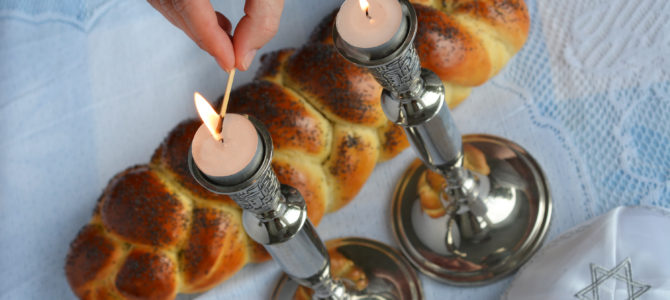
The Sabbath begins at 6:36 P.M. on Friday, October 1, and concludes at 7:46 P.M. on Saturday in the Vilnius region.
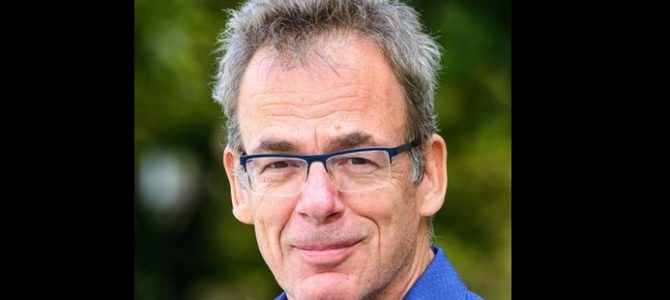
Vilnius University and the Lost Shtetl Museum are launching jointly a series of lectures and discussions called “Open Conversations on History” which will raise topical questions of historical truth, memory wars and society’s ability to resist the pressure to serve one or another ideology.
We invited Christoph Dieckmann, a prominent historian and author of books on German occupation policy and the Holocaust in Lithuania, to the first discussion at 6:00 P.M. on October 1. He will give a lecture called “Looking back on our past. Lithuanians, Germans, and Jews.”
Dieckmann will share his insights on the relationship between history and memory, talk about personal searches trying to find the best way to study the Holocaust in Lithuania and the method used to help incorporate the different perspectives of Holocaust participants.

The entire Community wishes Ela Gurina a very happy birthday. May your life be filled with bright moments, happiness and meaning. We wish you much love. Mazl tov. Bis 120!
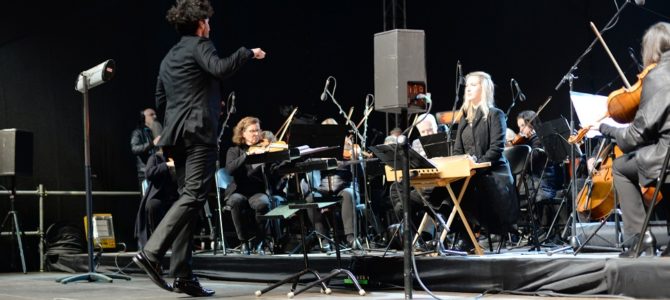
Photographs by Polina Butkienė
The courtyard of the President’s Office in Vilnius hosted a concert called “Symphony from Jerusalem of the North” to mark the Day of Lithuanian Jewish Victims of Genocide on September 23. The work composed by Jievaras Jasinskis was performed by the Vilnius St. Christopher Chamber Orchestra with special guest on Middle Eastern instruments Yaron Cherniak from Israel. Lithuanian National Ballet and Opera Theater senior conductor Ričardas Šumila conducted the ensemble.
Tadas Daujotas who performed on shofar horn said they thought deeply about the Litvak contribution over the centuries to Lithuanian culture and development as they created this work to mark the 80th anniversary of the beginning of the Holocaust in Lithuania. “We sought to pay respect to the memory of the Jews who lived in Lithuania and to express solidarity with the Jewish community through this music project,” he said.
Composer Jievaras Jasinskis said he wanted to show how intertwined Lithuanian and Jewish history is.
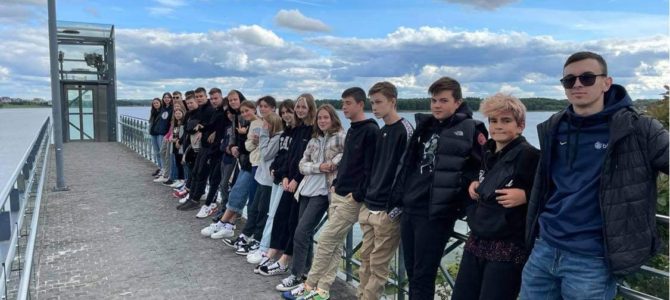
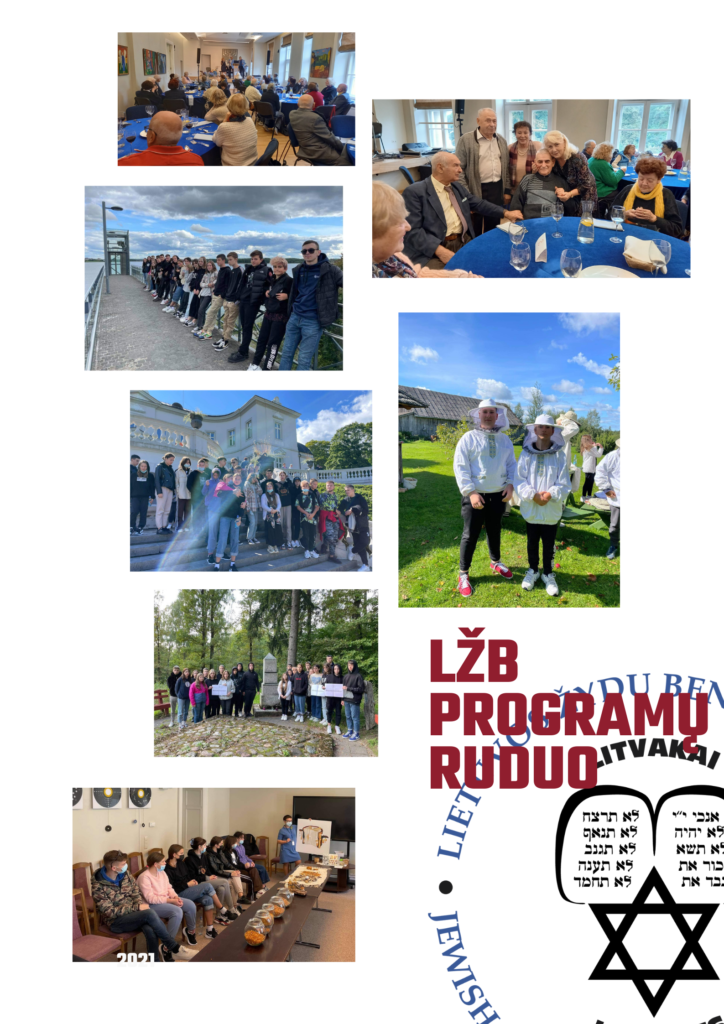
Mere hours before trial was set to begin, 96-year-old suspected war criminal Irmgard Furchner fled justice in Itzehoe, Germany, on Thursday, September 30. She’s accused of complicity in the murder of 11,000 people at the Stutthof concentration camp in what is now Poland between 1943 and 1945.
German media report she left the senior care home where she lives by taxi but failed to appear in court. A warrant was issued for her arrest. Law-enforcement managed to find her within several hours and the court must now decide whether she represents a real flight risk, and should be jailed before court proceedings resume on October 19.
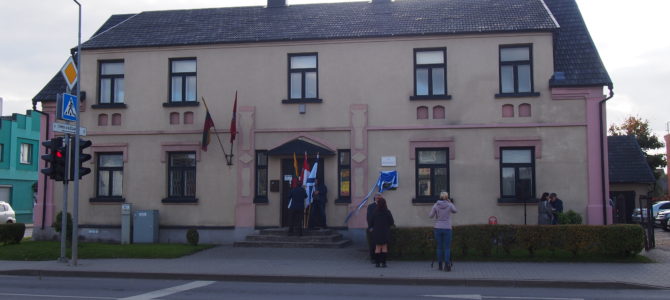
by Margarita Rimkutė, taurageszinios.lt
Perhaps not every resident of Tauragė knows that the building which houses the Tauragė district prosecutor’s office was once a Jewish primary school. On Wednesday a ceremony was held to unveil a plaque commemorating the 100th anniversary of the Tarbut school there. The event was part of a series of events in town called “The Shtetl in Tauragė.”
Senior events director of the Cultural Center Algima Juščiuvienė led the event and said the school established in 1921 held classes until 1941.
“The horrific tragedy of the Holocaust silenced the cries of children playing and killed the Jewish spirit of this city. In 1947 a Russian pre-gymnasium was set up in the building. In 1954 it housed the Tauragė music school, in 1988 an evening school, and since 1996 the building has belonged to the prosecutor general. It is the oldest school building in the city. The Jewish school which had four grades then had 250 pupils. All the school’s teachers were licensed and drew their salaries from the Ministry of Education. The school belonged to the Tarbut school network, meaning it was the strongest modern educational organization in Eastern Europe,” Algima Juščiuvienė said.
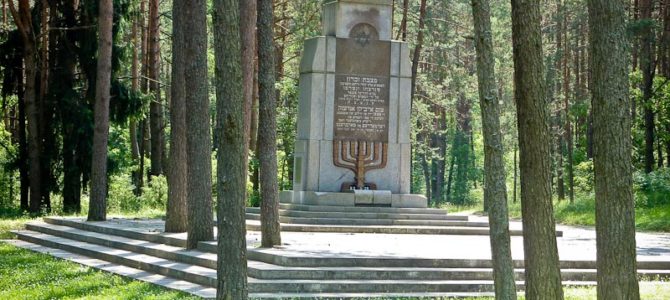
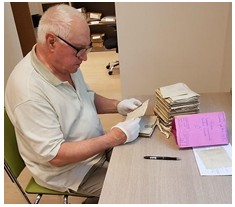
by professor Pinchos Fridberg
Vilnius
I would like to comment briefly on a press release which appeared on the webpage of the Lithuanian parliament on September 23.

My opinion about this resolution good in its entirety was shaken by the words “64 members of parliament voted unanimously.” De facto the word unanimously means the majority of representatives (77!!!) did not participate in the session dedicated to marking the Day of Genocide of Lithuanian Jews and the 80th anniversary of the beginning of the Holocaust in Lithuania.
Why they didn’t come to pay their respects on this tragic day of Lithuania’s history, I can only speculate.
The probability that all 77 had a justified reason not to attend is very small.
Did some of the representatives actually boycott this topic intentionally?
§§§
Translated from Lithuanian by Geoff Vasil.
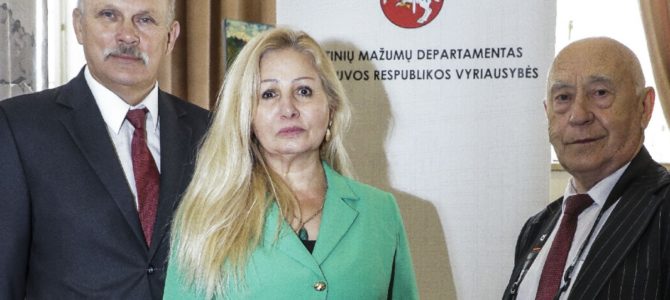
Congratulations to Lithuanian Jewish Community chairwoman Faina Kukliansky on receiving a gold medal prize from Lithuania’s Department of Ethnic Minorities at a ceremony held at the Vilnius Old Town Hall on Monday, September 27. She received the prize in recognition of her work in the year 2020.
Many others received similar prizes, including the mayor of the regional administration of Jurbarkas and the Zundelovičius family for the memorial to the Synagogues’ Square in Jurbarkas erected in 2019. The regional administration of the Telšiai district and its mayor were also recognized for the conservation of the Telz yeshiva building and its adaptation for public use in 2020.
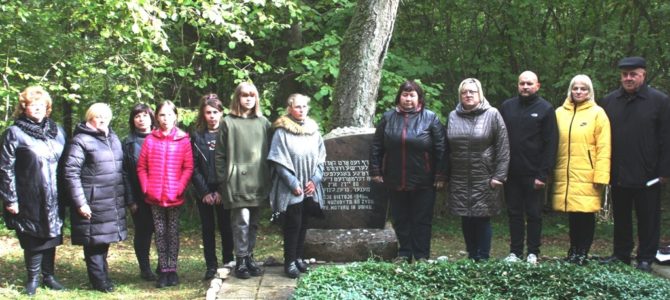
by Aušrinė Merkytė
Officials from the Subačius aldermanship and educational institutions as well as the public attended a commemoration September 23 to honor the memory of Holocaust victims buried in a mass grave on the hill called Lapakalnis in the Ilčiūnai Forest. According to the memorial monument which stands there, 80 people were killed there in July, 1941.
Inga Dovydėnienė, an employee at the Subačius section of the Kupiškis Cultural Center in charge of cultural activities, organized the event and began by reminding attendees that 80 years have passed since those terrific events and we no longer have among us many of the eye-witnesses, and are no longer able to hear the stories and testimonies of the families who died.

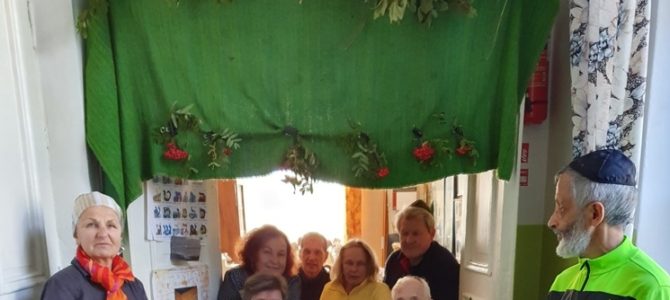
The Panevėžys Jewish Community held a traditional Sukkot holiday celebration September 25.
Survivor of the Kaunas ghetto and Ereda and Stuffhof concentration camps Dobrė Rozenbergienė has died. She was born in 1928. Our deepest condolences to her son, grandchildren, relatives and friends.
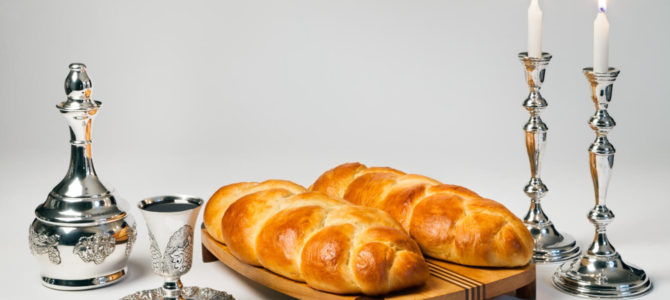
The Sabbath begins at 6:54 P.M. on Friday, September 24, and concludes at 8:05 P.M. on Saturday in the Vilnius region.
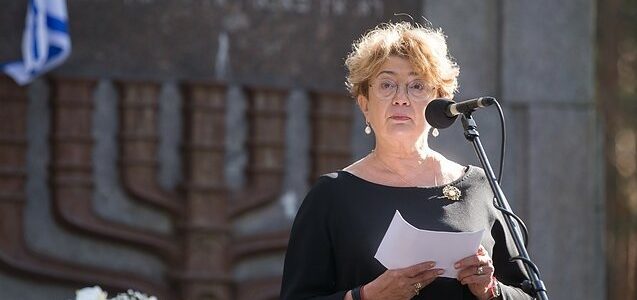
Honored guests,
I stand before you in order to deliver a speech, but this place and this sad occasion calls for concentrating and remaining silent. The reflection, respect and humble silence which meets every thinking and feeling person in this place cannot be confused with the silence of apathy, ignorance and fear. All of us have kept silent too long. Too long. We have kept quiet about what happened, where it happened and why. It was kept quiet for most of those eight decades we count since the beginning of the Holocaust in Lithuania. Out of fear? Ignorance? Apathy?
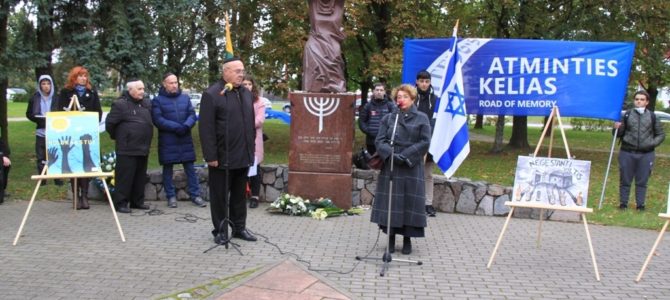
The Panevėžys Jewish Community commemorated the 80th anniversary of the onset of the Holocaust in Lithuania on September 22 with a “Road of Memory” procession meeting at the Sad Jewish Mother statue and regrouping later at the former ghetto gates and the mass murder site in the Kurganava Forest were about 8,000 Jews were shot in 1941.
“Eighty years ago a black mark was made in the history of Lithuania, resulting in the taking of almost 200,000 lives and the lives of about six million Jews in Europe,” Panevėžys Jewish Community chairman Gennady Kofman said.
The largest mass murder sites near Panevėžys are in the Žalioji and Kurganava Forests, but the district has more than 30 mass murder sites in total.
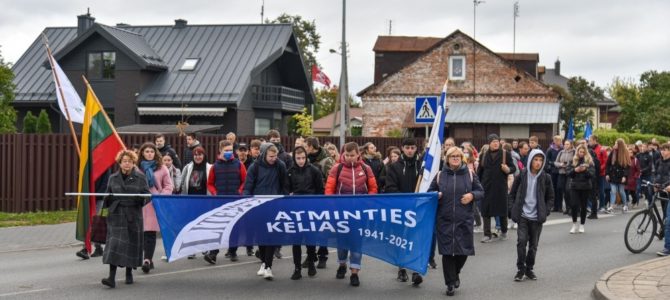
by Daiva Savckienė
On the eve of the Day of Remembrance of Lithuanian Jewish Victims of Genocide, the Panevėžys Jewish Community and guests marked this date with a “Road of Memory” procession, meeting at the Sad Jewish Mother monument, then later at the monument at the intersection of Krekenavos and Klaipėdos streets marking the site of the ghetto the Nazis established in Panevėžys, and then in the Kurganava Forest where about 8,000 people were murdered in 1941.
Panevėžys Jewish Community chairman Gennady Kofman said: “The small towns and large cities are marking the 80th anniversary of the Holocaust with processions.”
It’s not just this tragedy and the innocent people murdered being remembered. All of Lithuania suffered.
The Vilnius Photography Gallery located at Stiklių street no. 4 will open an exhibit by Kęstutis Grigaliūnas at 6:00 P.M. on September 22 called “Lithuanian Jews Who Came Back from the Nazi Concentration Camps.” The exhibit features 335 people who came back, with photographs and short biographies. It will also showcase the book “Lietuvos žydai grįžę iš nacių konclagerių” [Lithuanian Jews Who Came Back from the Nazi Concentration Camps] which contains 2,700 short bios and 335 portraits.
“The visualization of cases in this project becomes a space in which the violence of the Soviet state is examined and whose exhibiting under new spatial, media and institutional conditions allows for the execution of historical justice, and allows the eye and mind of the spectator to enter into intensive interaction with the past seen this way for the first time,” exhibit curator Natalija Arlauskaitė explained.
The Kaunas Jewish Community and the Ninth Fort Museum in Kaunas invite the public to attend a commemoration of Holocaust victims at 11:00 A.M. on Thursday, September 23, at the large statue to remember the victims of Naziism.
The commemorative program will last an hour and a half, to be followed by coffee in the museum’s administration building.
Program:
10:30 A.M. Registration
11:00 A.M. Commemoration begins, followed by an artistic reading of recollections by children who lived in ghettos, read by students from the Jonas Jablonskis Gymnasium, followed by a presentation of the “Ecce Homo: To Those Who Remain” project by the Ninth Fort Museum and the Kaunas 2022 organization including meeting the artists.

Sukkot or Sukkos beings at 7:04 P.M. in Vilnius on Monday, September 21, 2021.
The Festival of Sukkot–literally meaning booths, tents, tabernacles–is celebrated for seven days in Israel and eight days in the Diaspora, starting on the fifteenth day of the Hebrew month of Tishrei. It is one of the three festivals during which Jewish men were required to make pilgrimage to Jerusalem in the times of the Holy Temple.